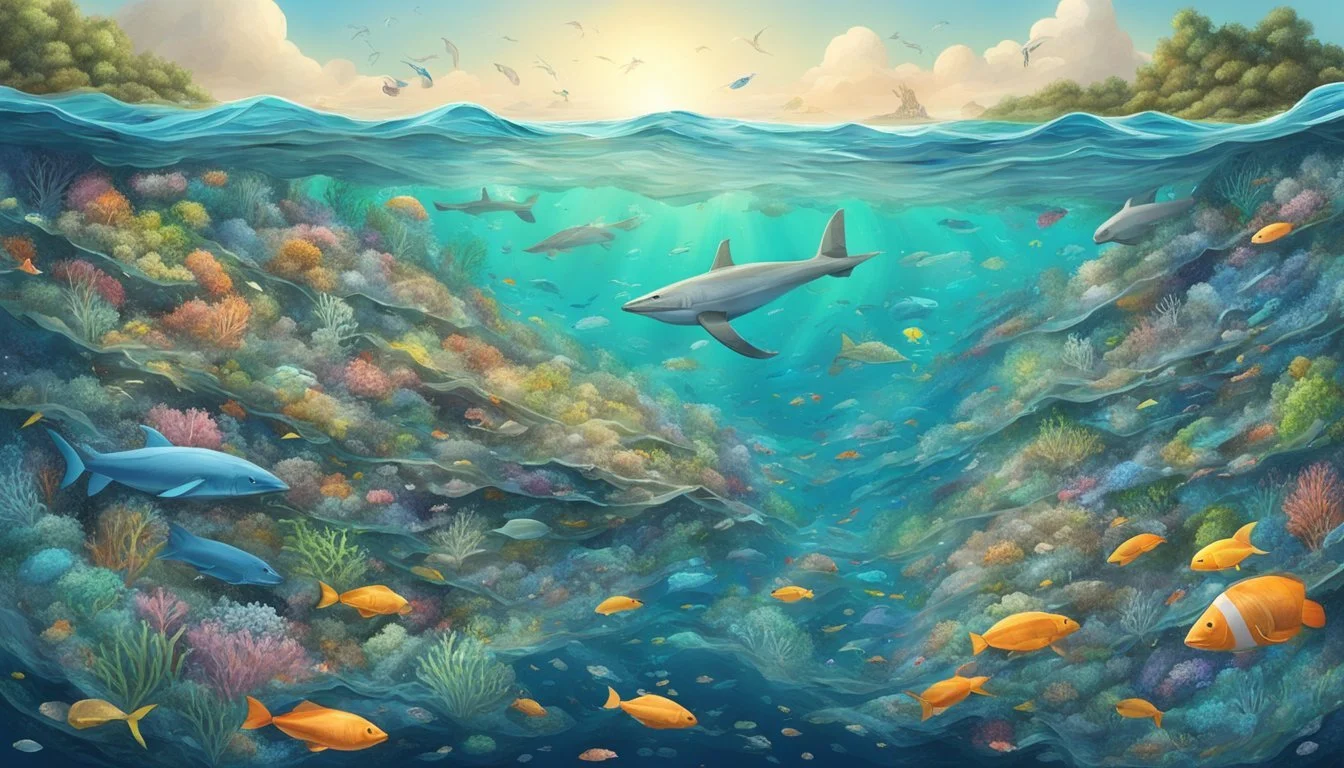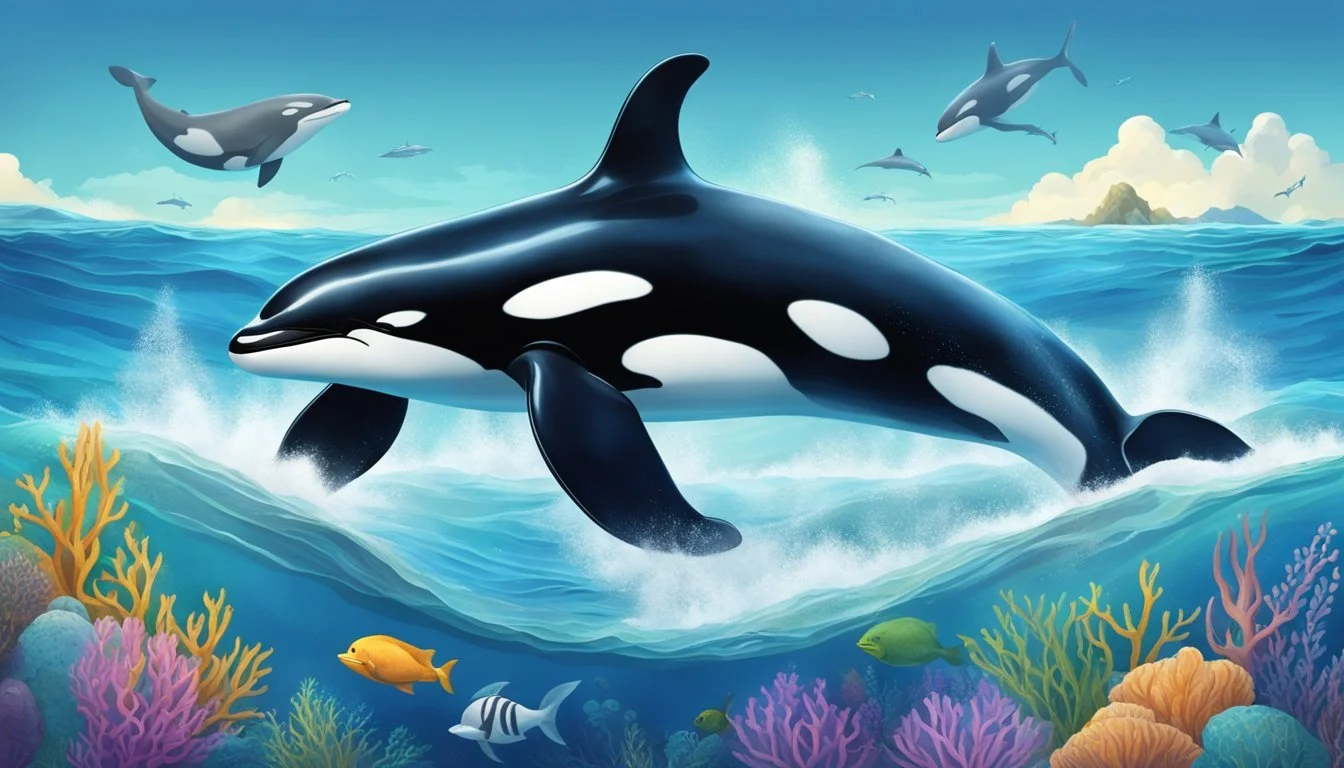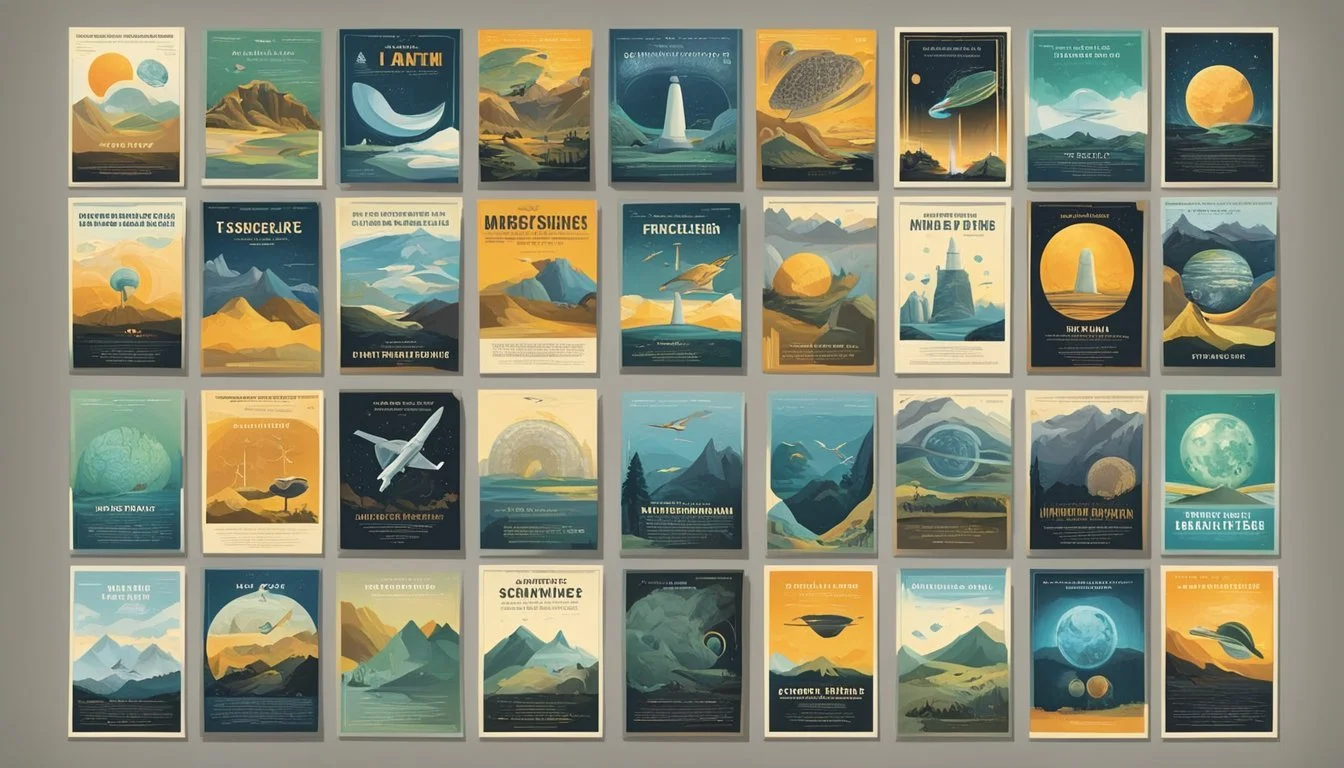12 Documentaries That Reveal the Truth About Popular Science Myths
Separating Fact from Fiction
Science documentaries offer a powerful medium for dispelling common misconceptions and revealing surprising truths about the world around us. These films combine expert knowledge, compelling visuals, and engaging narratives to shed light on complex scientific topics and challenge popular myths.
Viewers who watch science documentaries can gain a more accurate understanding of scientific phenomena and learn to critically evaluate commonly held beliefs. From exploring human dietary evolution to unraveling the mysteries of quantum physics, these documentaries provide accessible entry points into fascinating areas of scientific inquiry. They serve as valuable educational tools, inspiring curiosity and promoting scientific literacy among audiences of all ages.
1) 'The Magic Pill' by Rob Tate
'The Magic Pill' is a 2017 documentary directed by Robert Tate and produced by Pete Evans. The film explores the potential health benefits of a high-fat, low-carbohydrate diet, often referred to as the paleo or ketogenic diet.
The documentary follows several individuals with chronic health conditions who adopt this dietary approach. It presents case studies of people claiming improvements in conditions such as autism, diabetes, and cancer.
'The Magic Pill' argues that embracing fat as a primary fuel source can lead to significant health improvements. The film features interviews with doctors, scientists, and chefs who support this nutritional paradigm shift.
Critics of the documentary argue that some of its claims are not supported by mainstream scientific consensus. The film has sparked debate in the medical and nutrition communities about the role of diet in treating chronic diseases.
'The Magic Pill' raises questions about conventional dietary guidelines and encourages viewers to consider alternative approaches to nutrition and health.
https://www.imdb.com/title/tt6035294/
2) 'What the Health' by Kip Andersen
'What the Health' is a 2017 documentary that explores the connection between diet and chronic diseases. Directed by Kip Andersen and Keegan Kuhn, the film advocates for a plant-based diet.
The documentary presents interviews with health experts and examines the practices of major health organizations. It raises questions about the influence of the food industry on dietary recommendations.
'What the Health' makes several controversial claims about nutrition and health. Some of these assertions have been challenged by scientists and fact-checkers.
Critics argue that the film cherry-picks data and exaggerates certain points to support its narrative. They note that some of the documentary's statements about sugar and diabetes are not supported by scientific consensus.
Despite its contentious nature, 'What the Health' has sparked discussions about diet, health, and food industry practices. It encourages viewers to critically examine their food choices and seek out nutritional information.
3) 'Food, Inc.' by Robert Kenner
'Food, Inc.' is a documentary that examines the industrial production of meat, grains, and vegetables in the United States. Released in 2008, it was directed by Robert Kenner and narrated by Michael Pollan and Eric Schlosser.
The film explores how a handful of corporations control the majority of the food supply. It reveals the effects of this system on farmers, workers, consumers, and animals.
'Food, Inc.' investigates topics such as the use of antibiotics in livestock, the prevalence of corn in processed foods, and the environmental impact of large-scale farming practices. The documentary also highlights the influence of these corporations on government food policies.
Through interviews with farmers, industry insiders, and food safety advocates, the film presents a critical view of modern food production methods. It encourages viewers to consider the origins of their food and the broader implications of their dietary choices.
'Food, Inc.' received critical acclaim and was nominated for an Academy Award for Best Documentary Feature. It sparked discussions about food safety, sustainability, and the ethics of industrial agriculture.
4) 'Cowspiracy' by Kip Andersen
'Cowspiracy: The Sustainability Secret' is a 2014 documentary that challenges conventional wisdom about environmental conservation. Directed by Kip Andersen and Keegan Kuhn, the film explores the impact of animal agriculture on the environment.
The documentary argues that animal agriculture is the leading cause of deforestation, water consumption, and pollution. It suggests this industry contributes more to global warming than the entire transportation sector combined.
Andersen investigates why major environmental organizations seem reluctant to address this issue. He interviews representatives from various groups and examines their policies regarding animal agriculture.
The film presents a controversial perspective on sustainability, questioning whether current environmental efforts are targeting the most significant contributors to ecological damage. It encourages viewers to consider the role of dietary choices in environmental conservation.
'Cowspiracy' sparked debates about the environmental impact of meat and dairy production. It prompted discussions on the relationship between personal consumption habits and global environmental issues.
https://en.wikipedia.org/wiki/Cowspiracy
5) 'The Truth About Alcohol' by David Alrich
'The Truth About Alcohol' is a 2016 BBC documentary that explores common beliefs about alcohol consumption. The film follows A&E doctor Javid Abdelmoneim as he investigates the effects of alcohol on the human body.
Dr. Abdelmoneim and his team conduct various experiments to answer questions about one of the world's most popular drugs. They use cutting-edge science to examine how alcohol impacts different aspects of health.
The documentary was produced in response to the UK lowering its recommended alcohol intake for men to match that of women. This new guideline suggests a limit equivalent to about seven pints of beer per week.
Through a series of experiments and scientific analysis, the film aims to separate fact from fiction regarding alcohol consumption. It provides viewers with evidence-based information about the physical and psychological effects of drinking.
'The Truth About Alcohol' offers fresh insights into a widely consumed substance, challenging common misconceptions and presenting the latest research findings.
Wikipedia: The Truth About Alcohol
6) 'Forks Over Knives' by Lee Fulkerson
'Forks Over Knives' is a 2011 documentary that challenges conventional beliefs about nutrition and health. The film explores the potential of a plant-based diet to prevent and reverse chronic diseases.
Director Lee Fulkerson presents compelling evidence from renowned researchers and medical professionals. They argue that many degenerative illnesses can be controlled or reversed by avoiding animal products and processed foods.
The documentary follows individuals who adopt a whole-food, plant-based diet. It showcases their health improvements, including weight loss and reduced dependence on medications.
'Forks Over Knives' examines the link between modern Western diets and ailments like heart disease, diabetes, and cancer. It questions the necessity of animal proteins and fats for optimal health.
The film has sparked debates in the nutrition community and inspired many viewers to reconsider their dietary choices. It presents a radical perspective on food as medicine, challenging longstanding nutritional paradigms.
https://en.wikipedia.org/wiki/Forks_Over_Knives
7) 'A Plastic Ocean' by Craig Leeson
'A Plastic Ocean' is a groundbreaking documentary that exposes the alarming impact of plastic pollution on marine ecosystems. Directed by Craig Leeson, the film takes viewers on a global journey across 20 locations to investigate this pressing environmental issue.
The documentary originated from an unexpected discovery. While searching for blue whales, Leeson stumbled upon plastic waste in what should have been pristine ocean waters. This chance encounter sparked a four-year odyssey to explore the full extent of plastic pollution.
Leeson collaborates with free diver Tanya Streeter and a team of international scientists to uncover the devastating effects of plastic on marine life and human health. The film presents compelling evidence of how plastic waste disrupts ecosystems and enters the food chain.
'A Plastic Ocean' has garnered critical acclaim and numerous awards for its eye-opening portrayal of this global crisis. It serves as a wake-up call, urging viewers to reconsider their plastic consumption and take action to protect our oceans.
Learn more about 'A Plastic Ocean'
8) 'Before the Flood' by Fisher Stevens
'Before the Flood' is a 2016 documentary featuring Leonardo DiCaprio as he explores the impacts of climate change around the world. Directed by Fisher Stevens, the film takes viewers on a global journey to witness firsthand the effects of rising temperatures and changing weather patterns.
DiCaprio interviews world leaders, scientists, and activists to gain insights into the challenges posed by climate change. The documentary showcases melting ice caps, rising sea levels, and extreme weather events as evidence of a warming planet.
The film addresses climate change denial and examines the influence of fossil fuel industries on public perception and policy. It also highlights potential solutions, including renewable energy technologies and individual actions to reduce carbon footprints.
'Before the Flood' aims to educate viewers about the urgency of addressing climate change and inspire action to mitigate its effects. The documentary received praise for its comprehensive approach to explaining complex environmental issues in an accessible manner.
Wikipedia: Before the Flood (film)
9) 'Chasing Ice' by Jeff Orlowski
'Chasing Ice' challenges the myth that climate change is not visually observable. This documentary follows photographer James Balog on his Extreme Ice Survey mission to capture evidence of melting glaciers.
Balog and his team use time-lapse cameras to document glacial retreat across the Arctic. The film showcases stunning visuals of massive ice formations disintegrating and collapsing into the ocean.
One of the most striking sequences shows the largest glacier calving event ever captured on film. This dramatic footage provides irrefutable visual proof of rapid ice loss due to rising global temperatures.
'Chasing Ice' combines breathtaking cinematography with scientific data to demonstrate the reality of climate change. The film highlights how photographic evidence can powerfully illustrate complex environmental processes.
Through Balog's lens, viewers witness firsthand the drastic changes occurring in some of Earth's most remote regions. This documentary serves as a wake-up call about the urgent need to address climate change.
https://en.wikipedia.org/wiki/Chasing_Ice
10) 'The Great Global Warming Swindle' by Martin Durkin
'The Great Global Warming Swindle' is a 2007 documentary film directed by Martin Durkin. The film challenges the scientific consensus on climate change and anthropogenic global warming.
It features interviews with scientists and others who argue against the prevailing views on climate science. The documentary suggests that increased solar activity, not human-produced carbon dioxide, is responsible for observed warming trends.
The film sparked controversy upon its release. It received criticism from climate scientists and organizations for allegedly misrepresenting data and making misleading claims about climate change research.
'The Great Global Warming Swindle' examines potential political and economic motivations behind climate change policies. It questions the reliability of climate models and the accuracy of temperature records used to support global warming theories.
The documentary aired on Channel 4 in the UK and has since been shown in other countries. It remains a significant, albeit disputed, entry in the debate surrounding climate change science and policy.
https://en.wikipedia.org/wiki/The_Great_Global_Warming_Swindle
11) 'Blackfish' by Gabriela Cowperthwaite
'Blackfish' is a compelling documentary that examines the ethics of keeping orcas in captivity. Released in 2013, the film focuses on Tilikum, a captive orca involved in the deaths of three people.
Director Gabriela Cowperthwaite presents a critical look at SeaWorld's practices. The documentary challenges the myth that orcas thrive in marine park environments.
Through interviews with former trainers and experts, 'Blackfish' reveals the psychological and physical toll of captivity on these intelligent marine mammals. It explores the complex social structures of orca pods in the wild, contrasting them with the artificial groupings in captivity.
The film sparked public outcry and debate about the treatment of orcas in marine parks. It led to significant changes in SeaWorld's policies and public perception of orca shows.
'Blackfish' demonstrates the power of documentary filmmaking to expose hidden truths and challenge long-held beliefs about animal welfare in the entertainment industry.
12) 'An Inconvenient Truth' by Davis Guggenheim
'An Inconvenient Truth' is a 2006 documentary that features former U.S. Vice President Al Gore's campaign to educate the public about global warming. The film showcases Gore's multimedia presentation on climate change, which he has delivered to audiences worldwide.
Director Davis Guggenheim follows Gore as he travels, presenting scientific data and anecdotes to illustrate the urgent need for action on climate change. The documentary combines personal stories from Gore's life with compelling visuals and statistics.
The film aims to dispel myths surrounding global warming and clarify its potential consequences. It presents evidence of rising temperatures, melting glaciers, and changing weather patterns to demonstrate the reality of climate change.
'An Inconvenient Truth' received critical acclaim and won two Academy Awards. It played a significant role in raising public awareness about climate change and its potential impacts on the environment.
The documentary sparked discussions about environmental policy and individual responsibility in addressing global warming. It encouraged viewers to consider their carbon footprint and take action to reduce greenhouse gas emissions.
https://en.wikipedia.org/wiki/An_Inconvenient_Truth
The Influence of Media on Science Perceptions
Media plays a crucial role in shaping public understanding of scientific concepts and discoveries. Documentaries and news coverage significantly impact how people perceive and interpret scientific information.
Analyzing Documentary Narratives
Documentaries often present complex scientific ideas in accessible formats. They use storytelling techniques to engage viewers and explain intricate concepts. Visual aids, expert interviews, and real-world examples help simplify abstract theories.
Some documentaries challenge popular misconceptions. They present evidence-based information to debunk myths and clarify misunderstandings. This approach can lead to shifts in public opinion on scientific topics.
However, documentaries may sometimes oversimplify or sensationalize scientific findings. This can result in misinterpretation or exaggeration of research outcomes. Viewers should approach documentaries critically and seek additional sources for a comprehensive understanding.
Media's Role in Myth Propagation
News outlets and social media platforms can inadvertently spread scientific misinformation. Clickbait headlines and oversimplified reporting may distort research findings. This can lead to the propagation of myths and misconceptions about scientific topics.
Media coverage often focuses on controversial or sensational aspects of scientific research. This selective reporting can skew public perception of scientific issues. It may also create false impressions about the consensus within the scientific community.
Responsible science journalism plays a vital role in accurate information dissemination. Fact-checking, consulting multiple experts, and providing context are essential practices. These help ensure that media coverage of scientific topics is balanced and informative.
Evaluating Scientific Accuracy in Documentaries
Scientific documentaries play a crucial role in shaping public understanding of complex topics. Ensuring their accuracy requires rigorous fact-checking and expert input. Viewers must approach these films with a critical eye to separate fact from fiction.
Fact-Checking Popular Claims
Documentary filmmakers often present fascinating scientific claims to captivate audiences. To verify these assertions, viewers can:
Cross-reference with peer-reviewed journals
Check reputable science websites
Look for corroboration from multiple sources
Some documentaries may oversimplify complex ideas or present outdated information. It's essential to consider the film's production date and compare it with recent scientific developments.
Recognizing common pitfalls helps viewers spot potential inaccuracies:
Cherry-picking data
Misrepresenting statistical significance
Confusing correlation with causation
The Role of Experts in Documentaries
Credible scientific documentaries feature input from qualified experts in relevant fields. Viewers should:
Verify experts' credentials and affiliations
Look for consensus among multiple specialists
Be wary of lone voices contradicting established scientific understanding
Experts provide context, explain complex concepts, and offer insights based on current research. Their presence lends credibility to a documentary's claims.
Filmmakers must balance expert testimony with engaging storytelling. This can sometimes lead to oversimplification or dramatic emphasis on certain aspects of a topic.








